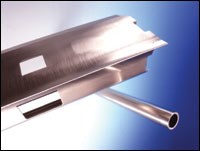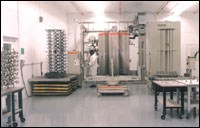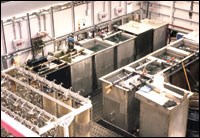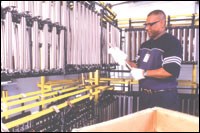The EN Plating Edge
Electrochemical Finishing experimented with several electroless nickel baths until it found one that produced maximum brightness even after 12 turnovers…
Understanding what it takes to succeed in the contract plating business cannot be found in a book; nor can you learn it from some university professor in a classroom. When four chemical company field representatives, who were also experienced plating specialists, founded Electrochemical Finishing (ECF), their knowledge was a result of experience. The company began with one location, 44th Street in Wyoming, MI. A second facility, Remico, was added in 1971. This was also in Wyoming. A third facility, dedicated to post-plating assembly and packaging for automotive projects was opened in 1997.
The plating facilities are quite different. The Remico plant, which also serves as corporate headquarters, emphasizes production runs for the plumbing and automotive industries; it also does zirconium PVD (physical vapor deposition), chromium plating, lacquering and clear powder coating.
In contrast, the 44th Street plant specializes in two areas. One focus is precious metal plating, such as gold plating laser cavities for MIL-spec projects. Quality control can't be overstated; inspections for finish consistency are performed under high magnification. The company also does gold plating for high-impact automotive applications.
The second specialty of the 44th Street plant is plating electroless nickel and electrolytic nickel onto items such as guitar bridges and industrial components, including pumps, valves and piston tubes that go into hydraulic cylinders. The tubes are processed for a leading manufacturer of treadmills. ECF also does some black nickel processing.
"Those shiny gold decorative items are what get kudos from consumers," said the company's production manager. "But it's the performance of the electroless nickel bath that's far more significant." Specifically, the electroless nickel bath consistently delivers 12 turnovers, which, is 50% more than the typical electroless nickel bath. This creates cost savings that benefit several key departments within ECF and allows the company to compete effectively in a price-sensitive marketplace.
"This is a chemical cost issue, a waste volume issue and a maintenance issue," the manager continued. "Six and maybe up to 8 turnovers are common, but we regularly get 12 without compromising brightness. This is critical, because when parts are plated at different times and in different baths, the degree of shine must be the same. And it is! Because of this consistency, we don't lose production time. Also, it's much easier to do maintenance adds than dumps, where you'd have to leach out tanks and follow a very time-consuming procedure."
ECF's electroless nickel bath was developed and custom-modified for ECF. The bath is Nitec Mid-Phos 2200, a matrix product based on a high-speed, medium-phosphorus electroless nickel formula. It replaced another electroless nickel bath that, despite a lot of time invested, dulled prematurely and failed to deliver more than eight turnovers. At the time ECF was looking into different electroless nickel baths, Heatbath Corp. was supplying ECF with Pentrate Ultra, a fast-processing black oxide for use on some of ECF's military work.
ECF considered several Nitec products. There are six, including one that provides 1,000+ hours of salt spray performance and is widely specified for parts with complex shapes. Nitec 2200, an exceptionally stable bath with 6-10% phosphorus content, was installed in 1997. Notably, with its previous bath, ECF had to use two additives to boost plating brightness. Those were replaced by just one for the new bath, at a substantial savings in chemical costs.
All processing begins at a common cleaning section, using an alkaline soak cleaner. The pretreatment for electroless-nickel-plated parts includes electrocleaning, acid pickling and activation by electrolytic rectification. The bath runs at approximately 185-205F and a pH of 4.6-5.2. The solution is filtered with a 10-micron polypropylene filter to ensure that the finish maintains a smooth finish. Parts have individual thickness requirements, but the most common spec for parts processed at ECF is 0.0001 inch.
The electroless nickel process features a nickel purifier, which contributes heavily to the bath's ability to consistently perform at 12 turnovers with consistent brightness. ECF recognizes that it loses a small amount of thickness per hour with 12 turnovers, but not nearly enough to move the plating outside specifications or interfere with production. Even at the high end of those turnovers, corrosion performance remains well within specifications.
Both before and since the solution make-up, ECF has consented to try other electroless nickel baths. "This one, though," said ECF management, "has treated us the best by far. We achieved 10 turnovers a couple of times out of another company's product, but it was a huge struggle and not worth it. Also, that same chemistry that a few times gave us 10 turnovers sometimes wouldn't even go to eight. That inconsistency was something the manufacturer couldn't fix or explain."
Today, the plant runs the highest volumes of electroless nickel-plated product in ECF's history. It is also applying electroless nickel to more substrates than ever: steel, cast iron, copper, brass, and zincated aluminum. Brightness and bath longevity are everything, according to the company. "Once your electroless nickel drops out, you're finished," noted the production manager. "This product is long-lived and consistent on all substrates. We realize we couldn't be where we are, without it."
Also, the electroless nickel deposit properties help ECF meet many tough specifications. Parts pass a 180-deg bend test per mil spec C-26074A. Rockwell C hardness as deposited is 48-54. After heat treating at 750-800F for 1 hr, the Rockwell hardness is 60-70. It also provides 65-80 microohms per cm electrical resistivity.
"I think we're unusual in a sense, because with our backgrounds, we really know electroless nickel. That can make us a tough customer, particularly when it comes to service and technical support. Those are areas, though, where we have nothing but good things to say. The supplier has given us excellent and often very original ideas on managing baths, waste and even labor."
ECF's recent projects include sprinkler heads and specialty fixtures, where specifications include equal plating both inside the part and out, plus high wear and corrosion resistance. There's additional military work as well. The Navy reportedly favors ECF's electroless nickel processing because it withstands exposure to fuels.
In 1999, Electrochemical Finishing received A2LA testing lab accreditation. The company also holds ISO 9002 certification and is completing work for its ISO 14001 certification. The company realizes that nickel is on EPA's and everyone else's list of things to regulate. But it also knows electroless nickel is better than the alternatives, like cadmium or chromium. Electroless nickel is a good replacement for either of these, plus ECF can filter the metal out of the sludge and sell it for re-use. That isn't waste; it's recycling. And ECF thinks this is very much the kind of thing that's needed for contract platers to succeed.
Related Content
Replacing Open-Top Vapor Degreasing in Aerospace Manufacturing
Options and considerations for cleaning aerospace parts as regulations tighten on vapor degreasing solvents.
Read MoreReplacing Discontinued Vapor Degreasing Fluids – 3 Things to Consider
What do you do when you learn your trusted line of vapor degreasing cleaning fluids will soon be discontinued? Elizabeth Norwood of MicroCare discusses what you should keep in mind when replacing discontinued vapor degreasing fluids.
Read MoreTop Shop Emphasizes Dedication, Work Ethic
With a primary focus on aerospace and defense work, American Metaseal Corp. of Arbutus, Maryland, has qualified as a Top Shop on multiple occasions.
Read MoreVapor Degreasing Cleaning Fluids for Precision Cleaning
Tergo XCF2 cleaning solution is designed to meet diverse industrial technical cleaning needs with formulas that deliver reliable and repeatable cleaning performance.
Read MoreRead Next
Delivering Increased Benefits to Greenhouse Films
Baystar's Borstar technology is helping customers deliver better, more reliable production methods to greenhouse agriculture.
Read MoreEducation Bringing Cleaning to Machining
Debuting new speakers and cleaning technology content during this half-day workshop co-located with IMTS 2024.
Read MoreA ‘Clean’ Agenda Offers Unique Presentations in Chicago
The 2024 Parts Cleaning Conference, co-located with the International Manufacturing Technology Show, includes presentations by several speakers who are new to the conference and topics that have not been covered in past editions of this event.
Read More


























